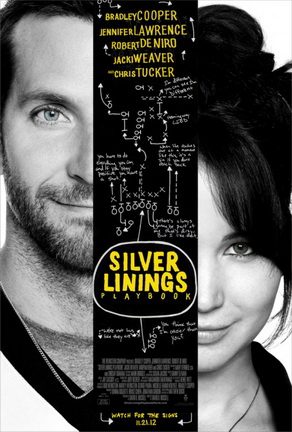
Writer and director David Russell (“The Fighter”) doesn’t cease to impress with his new Oscar-worthy film “Silver Linings Playbook,” which premieres Nov. 21. The film stars Bradley Cooper (“The Hangover”) as Pat, an overly aggressive man fresh out of the mental hospital on a mission to reroute his life. Alongside him, Jennifer Lawrence (“The Hunger Games”) plays Tiffany, a bold and outspoken young woman recovering from the abrupt loss of a loved one. The two rely on one another to maintain their separate therapeutic remedies, their encounters often yielding shocking outcomes and stressful conversations. If you didn’t think these actors could handle such serious roles, after witnessing this film that doubles as an artistic statement on psychological disorders, you’ll never see them again as just the attractive drunken idiot and the tough teen fighting for survival in a fantasy world.
One of the most dramatic scenes of the film centers on a highly dysfunctional group of frustrated people engaged in a tense argument that touches upon mental illness, gambling, sports and an irrational belief in superstition. It does all this while making the audience laugh momentarily, allowing us to release a shaky breath and feel relieved of a certain anxiety that lingers from the opening credits. The camera cuts across the room, following the action, sometimes highlighting background remarks and simultaneous disagreements. The scene seems to drag on for an unconventionally long period of time, but it doesn’t do that — it progresses. Storylines cross, emotions are heightened, twists begin to form and the final plan is set in action.
All of this comes across in one scene. One well-choreographed scene gives you a sudden gut feeling about characters that changes your entire prior perception of them. One striking scene lifts the overpowering discomfort, this wholly empty sensation that resides in the limbo between happiness and tragedy, and fills it with ephemeral joy. That joy has the same qualities it would have in reality — we don’t walk away unaffected like characters at the end of sitcoms. It acts as one quick escape, one reminder that these fictional people and situations might as well be living in your neighborhood.
Although the trailer portrays the film as an offbeat romantic comedy with a slight dramatic tinge, “Silver Linings Playbook” doesn’t exactly fit any one category. The movie contains a record number of scenes involving characters losing their every inhibition and full on screaming at one another. The film itself parallels the reality of the characters afflicted with bipolar disorder: it ranges most drastically from lighthearted, to very profound tragedy, to absolute indignation. There are a few structural and cinematographic techniques employed in the film that you may recognize in the classic romantic comedy, but they complement the realism established throughout.
See this movie. It is uncomfortable, dangerous, enlightening, harsh, lovely, warmhearted, tense and above all, everything is unexpected. It leaves a sinking feeling inside of you. It has the power to alter the mental state you were in upon entering the theater. That power is not guaranteed in every movie you see, but I can tell you that it exists here.
